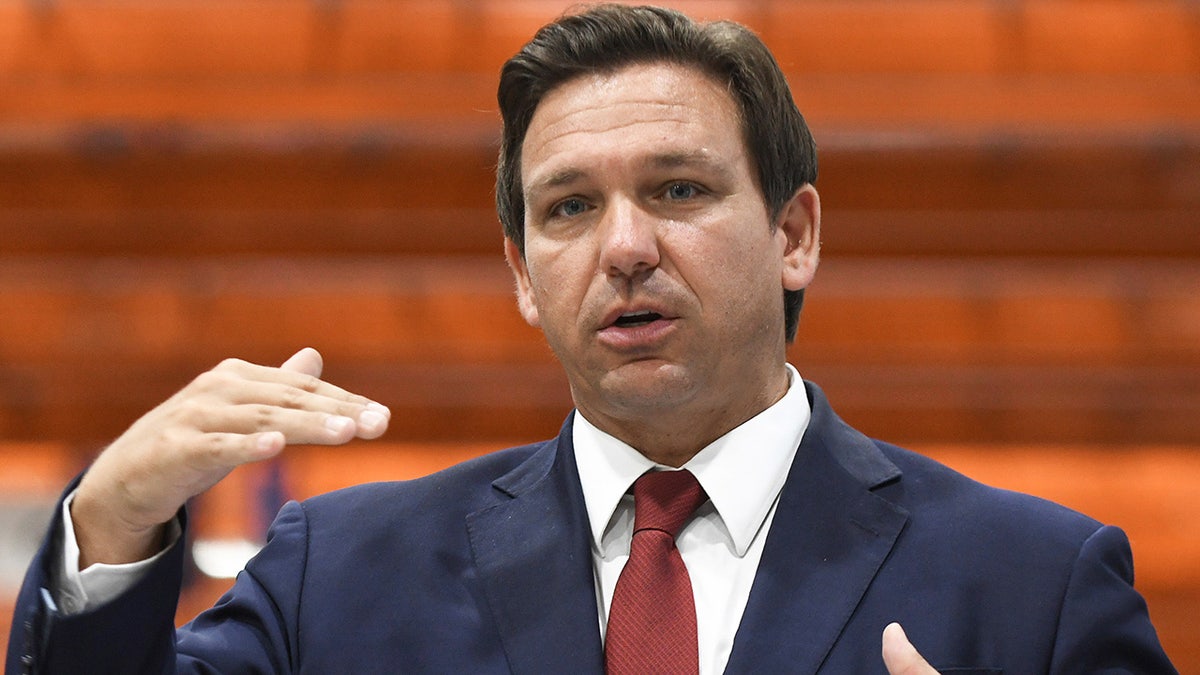Ron DeSantis: This was appalling to hear
Florida Gov. Ron DeSantis says politicians like Charlie Crist and Kathy Hochul do believe conservatives are 'second-class citizens' on 'Unfiltered with Dan Bongino.'
A New York Times guest essay penned by Thomas Edsall warned that the re-election of Gov. Ron DeSantis, R-Fla., would be a "test case" for the decline of democracy in the United States.
Edsall asserted it would demonstrate that Americans, even in a "purple state" such as Florida, are willing to elect authoritarians and reject liberalism.
Edsall opened his piece, titled "Ron DeSantis Is a Test Case," claiming, "The fact that Ron DeSantis, the governor of Florida, is favored to win re-election is a clear warning to those worried about declining support for democratic institutions and values in the United States."
What’s worse is that this election "suggests that under certain circumstances the American electorate will tolerate, if not actively embrace, the abuse by domineering leaders of traditional political norms," Edsall wrote. It would also prove that millions of "mainstream" Americans are fed up with liberal policies.
NEWSOM WANTS TO 'MAKE DESANTIS A ONE-TERM GOVERNOR' PLEDGES $100,000 TO CRIST'S CAMPAIGN

New York Times guest essay claims that the success of Gov. Ron DeSantis, R-Fla., shows that the U.S. might be headed for a decline in democracy. (Getty Images)
"A DeSantis victory would also demonstrate that the hostility of many mainstream voters to controversial liberal initiatives on social and cultural issues is strong enough to generate formidable backlash," he added.
The author listed several of DeSantis’ policies from his first term, including banning "54 math textbooks" from Florida public schools which feature "social-emotional learning content," vetoing state funds for the Tampa Bay Rays training facility "after the baseball team publicly spoke out against gun violence through its Twitter account," and his threats to fine the Special Olympics "if it continued to insist on a Covid-19 vaccine mandate for participants."
Adding the governor’s feud with Disney over the leftist dubbed "Don’t Say Gay" bill, Edsall described these actions as "examples of DeSantis’s at once calculated and provocative behavior."
The author warned, "In this context, the DeSantis governorship provides insight into what our national life might look like if, in 2024, Republicans win a clean sweep giving them control of the White House, the Senate and the House."
Edsall added that DeSantis pushing "these boundaries is no surprise. What is surprising is the absence of strong, organized opposition in a purple state." He explained that this lack of opposition is due to the fact that "his policies have substantial support" in Florida.
Providing evidence of growing support for DeSantis’ "calculated and provocative" behavior, the author cited a recent Hart Research Associates poll, a Democratic survey, asking "questions on contentious education issues" to nearly 1800 voters in battleground states.
According the Hart poll, 37% of those surveyed found that candidates who outlined their agenda to protect the rights of parents in their children’s education, and fight back against schools "indoctrinating students with liberal political ideas," were "extremely appealing."
"19 percent ranked the message as a 7 or 8, fairly appealing. 14 percent were neutral at 5-6 and 30 percent were in the 0-4 range, not appealing," Edsall added.
CHARLIE CRIST'S RUNNING MATE PREVIOUSLY SAID CUBANS 'MOURN' FIDEL CASTRO'S DEATH

New York Times contributor Thomas Edsall cited Democratic polling showing that a plurality of Americans in swing states would support a candidate like DeSantis in the future. (Paul Hennessy/SOPA Images/LightRocket via Getty Images)
The Hart poll also revealed that "roughly a third of Democrats and half of independents said they would back such a candidate," the author wrote.
Edsall then wondered what experts thought it would "be like living in this country in 2025 if Trump, DeSantis or one of their emulators wins the White House backed by Republican majorities in the House and Senate."
Speaking to handful of them, they all claimed that democracy would be slowly ground down under such a candidate. Arturas Rozenas, a professor of political science at N.Y.U, mentioned that such a candidate could implement an "authoritarian takeover" that is slow and "not easily detectable" so as not to "activate opposition."
Stanford senior fellow Larry Diamond claimed such leadership would engage in "extreme politicization and abuse of federal government power, the targeting of political enemies, and the mobilization and emboldening of the violent, well-armed, extremist fringe of Trump followers"
U.C.L.A. law professor Richard Hasen mused about how the 2024 election could involve Trump Republicans stealing the election.

Florida Governor Ron DeSantis brings his wife Casey DeSantis on stage during a campaign event for Republican Senate candidate J.D. Vance run by Turning Point Action in Youngstown, Ohio, U.S., August 19, 2022. (REUTERS/Gaelen Morse)
Edsall subsequently wrote, "DeSantis’s re-election bid, along with his future national prospects — along with those of Trump and the politicians who imitate him — will be a test of the direction the United States is poised to take at a time when, to quote the Harvard economist Dani Rodrik, ‘The world’s economic-political order appears to be at an inflection point, with its future direction hanging very much in balance.’"
CLICK HERE TO GET THE FOX NEWS APP
The author warned that the political climate is ripe for such authoritarian leaders. "The combination of racial and ethnic tension — and the continuance of economic dislocation unfairly distributed across the nation — has turned the United States into a testing ground for right-wing populism."
Edsall concluded his piece with a last glance at the November election in Florida. "In fact, the Florida election will be a referendum on democracy, and the odds do not look good," he wrote, acknowledging DeSantis’ chances.

